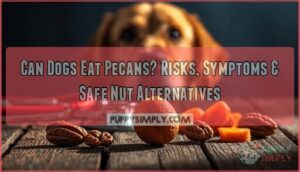This site is supported by our readers. We may earn a commission, at no cost to you, if you purchase through links.
Your dog’s fascination with that pecan pie cooling on the counter might seem harmless, but pecans rank among the most dangerous nuts you can leave within paw’s reach. Unlike peanuts or cashews that dogs can tolerate in small amounts, pecans contain juglone—a natural compound that disrupts canine digestion—and frequently harbor mold-produced mycotoxins capable of triggering neurological symptoms.
The risks don’t stop there: their high fat content threatens acute pancreatitis, while their size and shape create choking hazards even in larger breeds.
Understanding which nuts pose genuine threats versus safe alternatives equips you to make informed decisions when your curious companion inevitably encounters these holiday staples.
Table Of Contents
Key Takeaways
- Pecans contain juglone and frequently harbor mycotoxin-producing molds that trigger gastrointestinal distress, neurological symptoms like tremors and seizures, and potentially fatal pancreatitis in dogs due to their 70% fat content.
- Even a single pecan poses serious risks, including choking hazards, intestinal blockages requiring surgery, and toxic reactions that can appear within hours of ingestion, regardless of your dog’s size or breed.
- If your dog eats pecans, remove remaining nuts immediately, monitor for vomiting, diarrhea, tremors, or lethargy, and contact your vet or ASPCA Poison Control (1-888-426-4435) right away—especially if mold contamination is suspected or neurological signs appear.
- While pecans and walnuts are never safe, you can offer plain unsalted peanuts or cashews as occasional treats in strict moderation, but always avoid macadamia nuts, black walnuts, and any mixed nut products that compound toxicity dangers.
Can Dogs Eat Pecans or Other Nuts?
You might wonder if sharing your favorite snack with your dog is harmless, but regarding pecans, the answer isn’t what most pet owners expect. Pecans present real health risks that go beyond a simple upset stomach.
Let’s break down what makes pecans dangerous, why they’re toxic, and clear up some common myths about feeding nuts to dogs.
Are Pecans Safe for Dogs?
No, pecans aren’t safe for your dog. Major veterinary organizations, including the American Kennel Club, classify pecans as unsafe and potentially toxic for canine health. You’ll want to keep these nuts out of reach entirely because:
- Juglone toxicity – This natural compound causes gastrointestinal distress in dogs.
- Mold contamination risks – Pecans often harbor aflatoxin-producing fungi.
- Pancreatitis trigger – High fat content can spark painful pancreatic inflammation.
Even small amounts can cause problems in sensitive dogs. Dogs can experience severe nut consumption risks if they eat pecans regularly.
Why Pecans Are Toxic to Dogs
Your dog’s digestive system can’t safely process pecans because of a compound called juglone—a naphthoquinone present throughout the nut. This natural toxin triggers vomiting and abdominal discomfort even in small amounts.
Beyond juglone effects, pecan toxicity in dogs stems from mycotoxin risks when molds like Aspergillus colonize the shells, producing aflatoxins that damage liver tissue and trigger neurological symptoms.
Understanding the pecan health risks is vital for dog owners to prevent toxicity.
Common Misconceptions About Nuts for Dogs
Many owners assume nut toxicity levels work the same across varieties, but that’s misleading. While cashews pose minimal threat when roasted, black walnuts trigger neurologic crises unlike hazelnuts.
You might think a single pecan won’t harm your dog, yet even small quantities spark gastrointestinal upset in sensitive cases. Pet owner awareness of canine dietary needs prevents the dangerous belief that human nutrition facts translate to safe feeding guidelines for dogs.
Even one pecan can trigger gastrointestinal upset in dogs, so pet owners must never assume human nutrition rules apply to canines
Dangers of Pecans for Dogs
Pecans pose multiple serious threats to your dog’s health, from toxic compounds to physical hazards. Understanding these specific dangers helps you recognize why even a small amount can lead to an emergency.
Let’s break down the key risks that make pecans off-limits for dogs.
Toxic Compounds in Pecans (Juglone, Mycotoxins)
The chemistry behind nut toxicity makes pecan toxicity particularly dangerous for your dog. Two primary threats drive pecan toxicity: juglone, a natural compound found throughout pecan plant tissues, and mycotoxins produced by molds that colonize these nuts. Understanding these toxic compounds helps explain why even small amounts can trigger serious dog health risks:
- Juglone effects include vomiting, diarrhea, and abdominal discomfort within hours
- Tremorgenic mycotoxins can cause neurological symptoms like tremors and seizures
- Aflatoxins damage the liver and create systemic toxicity
- Both toxins remain potent even in trace quantities
Mold and Aflatoxin Risks
Beyond juglone itself, fungal contamination creates another serious threat you can’t overlook. Aspergillus species colonize pecans and produce aflatoxins—potent liver toxins that trigger vomiting, jaundice, and potential liver failure in dogs.
Even well-stored pecans aren’t immune; improper pecan storage in warm, humid conditions accelerates mold growth. Aflatoxin detection reveals toxicity levels sometimes exceeding 500 ppb, making mold prevention and fungal control essential protective measures.
Choking and Intestinal Blockage Hazards
Physical obstruction poses immediate dangers when your dog swallows pecans whole. These nuts create serious choking hazards because their size perfectly matches canine airway dimensions, especially in smaller breeds.
Here are the key risks:
- Esophageal obstruction accounts for 42.53% of upper gastrointestinal foreign body cases
- Intestinal blockages from whole pecans require surgical foreign body removal in 5.30% of incidents
- Nut choking disproportionately affects small breeds, representing 92.79% of esophageal cases
Emergency surgery averages $4,383 nationally.
High Fat Content and Risk of Pancreatitis
Pecans pack roughly 70% fat by weight, making them potent dietary triggers for pancreatitis in dogs. Fat metabolism disturbances from high-fat foods increase pancreatitis risk substantially—studies link fatty table scraps to a 2.2-fold higher likelihood of this painful condition. Breeds like Miniature Schnauzers face even greater susceptibility.
Nutritional guidelines for pet health risks recommend keeping dietary fat under 20% to prevent toxic foods complications and protect dog nutrition.
Symptoms of Pecan Toxicity in Dogs
If your dog gets into pecans, you’ll need to watch for several warning signs that something’s wrong. The symptoms can range from mild stomach upset to serious neurological problems, depending on how much your dog ate and whether the pecans were moldy.
Here’s what to look out for so you can act quickly if needed.
Gastrointestinal Problems (Vomiting, Diarrhea)
If your dog snags a pecan, gastrointestinal issues in dogs often strike first. The high fat content triggers fat-induced damage to the digestive lining, while juglone—a compound naturally found in pecans—compounds stomach upset. Vomiting and diarrhea are hallmark signs of toxic foods causing digestive issues:
- Severe vomiting within hours of ingestion
- Persistent diarrhea leading to rapid dehydration
- Abdominal pain and visible discomfort
These gastrointestinal problems signal your dog’s system is rejecting something harmful to dog nutrition and health.
Neurological Issues (Tremors, Seizures)
When tremors or seizures appear, they’re often the most alarming signs of pecan poisoning. Tremorgenic mycotoxins from moldy pecans target your dog’s nervous system, causing fine muscle tremors that can escalate to full seizures within hours. These neurotoxin effects range from stumbling and hyperesthesia to life-threatening convulsions requiring emergency anticonvulsants.
| Neurological Sign | What You’ll Notice |
|---|---|
| Fine Muscle Tremors | Uncontrollable shaking, especially in limbs |
| Ataxia | Loss of coordination, wobbly gait |
| Hyperesthesia | Overreaction to touch or sound |
| Intention Tremors | Shaking worsens with movement |
| Generalized Seizures | Convulsions, loss of consciousness |
Brain damage becomes a real risk if tremor causes and seizure triggers aren’t addressed quickly—these toxic nuts don’t mess around with neurological disorders.
Signs of Pancreatitis
When your dog’s pancreas flares up after eating pecans, you’ll notice a troubling cluster of signs. Pancreatitis symptoms usually include persistent vomiting, diarrhea, and lethargy—appearing in over 90% of affected dogs. Abdominal pain is equally common, often causing your pet to adopt a “praying position” with rear raised and front lowered.
These vomiting causes demand emergency care and immediate canine diagnosis.
Dehydration and Other Complications
Beyond the visible distress, those gastrointestinal issues trigger serious fluid loss that compounds pecan toxicity. Vomiting and diarrhea rapidly deplete your dog’s fluids, leading to dehydration that strains every organ system:
- Electrolyte imbalance disrupts heart rhythm and muscle function
- Hypovolemic shock can develop within 12 hours in severe cases
- Organ failure becomes likely without aggressive rehydration
Systemic inflammation follows, making immediate veterinary intervention essential.
What to Do if Your Dog Eats Pecans
If your dog gets into pecans, you need to act quickly. The steps you take in the first few minutes can make a real difference in preventing serious complications.
Here’s what you should do to protect your dog and when it’s time to call for professional help.
Immediate Actions and When to Seek Help
Spotting trouble early makes all the difference when your dog sneaks a handful of pecans. First, remove any remaining nuts and note how many were eaten—along with whether they looked moldy. Then check for vomiting, diarrhea, tremors, or lethargy.
| When to Call Your Vet or Poison Control | When Home Monitoring May Be Appropriate |
|---|---|
| Repeated vomiting (3+ times in 24 hours) | Single small plain pecan, no symptoms after 12 hours |
| Tremors, seizures, or disorientation | Bright, active dog with normal appetite |
| Hunched posture or visible abdominal pain | No pre-existing pancreatitis or health issues |
Contact the ASPCA Animal Poison Control Center (1-888-426-4435) immediately if mold contamination is suspected or if your dog weighs under 20 pounds—smaller pets face higher toxicity risk. For any neurological symptoms or persistent gastrointestinal distress, skip home observation and head straight to an emergency veterinary clinic.
Even minor exposure warrants a call to your primary vet within 24 hours to discuss follow-up care and prevention strategies.
Veterinary Treatments and Emergency Care
Once you’re at the clinic, veterinary care follows structured emergency protocols customized to pecan poisoning severity. Your vet’s treatment plan may include:
- Decontamination methods: Inducing vomiting within two hours using apomorphine, followed by activated charcoal to bind juglone and mycotoxins
- Fluid therapy: Intravenous crystalloids at 2-4 ml/kg/hour to correct dehydration and support kidney function
- Antiemetic drugs and pancreatitis treatment: Maropitant for nausea control, buprenorphine for pain relief, and Fuzapladib sodium injections to halt inflammation
Monitoring and Follow-Up Care
After treatment stabilizes your dog, home care tips and symptom tracking become your next priority. Watch for lingering gastrointestinal issues over 24–48 hours—vomiting or lethargy signal complications. Mild pancreatitis improves within 2–5 days, though severe cases need longer recovery timelines. Schedule follow-up visits 7–10 days post-discharge for veterinary checkups. Here’s what proper monitoring looks like:
| Monitoring Area | What to Watch | When to Act |
|---|---|---|
| Hydration Status | Skin elasticity, gum moisture | Offer water frequently |
| Digestive Function | Vomiting, diarrhea frequency | Contact vet if persistent >48hrs |
| Neurological Signs | Tremors, coordination issues | Seek immediate veterinary care |
| Energy Levels | Lethargy, appetite changes | Monitor daily for 1–2 weeks |
| Pain Indicators | Abdominal tenderness, bloating | Report during veterinary checkups |
Full recovery from pecan poisoning depends on early intervention and consistent veterinary advice throughout healing.
Safe Nut Alternatives for Dogs
While pecans aren’t a safe option for your dog, you don’t have to eliminate all nuts from their diet. Some nuts can be offered as occasional treats when you understand which ones are safe and how to serve them properly.
Let’s look at which nuts get the green light, which ones to steer clear of, and how to introduce new foods without putting your pet at risk.
Nuts Dogs Can Eat in Moderation
While pecans are off-limits, you can offer your dog a few safe nuts for dogs as occasional healthy snacking options—think of them as tiny nutritional bonuses rather than dietary staples. Proper nut storage prevents mold contamination, and understanding canine digestion helps you avoid overloading your pet’s system with tree nuts.
- Peanuts: Unsalted peanuts support canine nutrition with protein and vitamin E, but always check for xylitol and monitor for peanut allergy signs
- Cashews: These tree nuts offer magnesium for dog nutrition and diet, yet their calorie density demands strict portion control
- Chestnuts: Lower in fat than other options, cooked chestnuts provide safer healthy snacking when served plain and bite-sized
- Pine Nuts: Rich in iron and safe nuts for dogs territory, these require sparing use due to substantial fat content affecting canine digestion
Nuts to Always Avoid
Several tree nuts belong on your permanent no-go list: macadamia nuts trigger canine poisoning with just one nut in small dogs, causing weakness within hours. Walnuts and pecans harbor toxic nut effects from juglone and mold-based tremorgenic mycotoxins.
Almonds and pistachios pose choking risks and aflatoxin exposure.
All mixed nut products compound these nut toxicity dangers, making strict avoidance essential pet safety tips.
Tips for Introducing New Foods Safely
When trialing safe foods for dogs, gradual introduction over 7–14 days prevents digestive upsets and allows detection of food allergies. Follow these nutrition safety principles:
- Start small: Limit new items to 10% of daily calories to maintain nutritional balance
- One at a time: Introduce single foods weekly to identify food hazards
- Monitor closely: Watch for vomiting or diarrhea during adjustment periods
Respecting canine dietary restrictions protects your companion.
Frequently Asked Questions (FAQs)
Can dogs eat pecans?
No, you shouldn’t feed your dog pecans. These nuts contain juglone and are susceptible to molds producing dangerous mycotoxins, creating serious canine health risks including gastrointestinal distress, neurological symptoms, and potential pancreatitis from their high fat content.
Are nuts safe for dogs to eat?
Not all nuts carry the same risk for your dog. While some varieties can be tolerated in tiny amounts, others contain compounds that threaten canine health through toxicity, choking hazards, or gastrointestinal issues.
Can pecans cause pancreatitis in dogs?
Yes, pecans can trigger pancreatitis in dogs because their fat content—roughly 70–75%—far exceeds safe canine dietary levels.
High-fat foods like pecans overwhelm your dog’s pancreas, causing inflammation and serious digestive upset.
Are pecan halves safe for dogs?
No, pecan halves aren’t safe for your dog. Even fresh-looking halves contain juglone—a toxic compound—and may harbor invisible mold that triggers gastrointestinal issues in dogs, neurological signs, or pancreatitis requiring emergency veterinary care.
Are pecans healthy snack?
A single ounce delivers nearly 200 calories and rich monounsaturated fats that lower cholesterol—nutrient benefits that make pecans a heart-healthy choice for humans, though pecan allergies require caution in susceptible individuals.
Can dogs eat pecans & walnuts?
Veterinary nutrition guidance classifies both pecans and walnuts as unsafe for dogs. Their juglone content, mold-related mycotoxins, and high fat density create serious risks, including gastrointestinal upset, pancreatitis, neurological issues, and potential toxic nut poisoning.
Can dogs eat nuts?
The answer depends on the type. Plain peanuts and cashews make safe dog treats in moderation, while toxic nuts like macadamia and black walnut pose serious pet safety risks to your canine diet.
Are nuts bad for pets?
Most nuts pose pet nutrition risks due to high fat, excess sodium, and toxic compounds. Macadamias cause poisoning, pecans contain juglone, and moldy varieties produce dangerous mycotoxins that trigger canine digestion issues requiring emergency care.
What happens if my dog eats a pecan?
One pecan seems harmless—but for your dog, it’s anything but. Vomiting, diarrhea, and lethargy often appear within hours, signaling pecan poisoning.
Worse, tremors or pancreatitis can follow, demanding emergency care and veterinary intervention immediately.
Which nuts are toxic to dogs?
Macadamia nuts, black walnuts, and pecans top the toxic nut list for dogs. Even small amounts can trigger tremors, vomiting, and seizures—serious canine health risks you don’t want to gamble with.
Conclusion
The choices you make today about what your dog can and can’t eat will shape their long-term health tomorrow. While the question “can dogs eat nuts pecans” has a clear answer—no—the bigger lesson lies in preventive vigilance.
Keep pecans secured, educate family members about these risks, and when holiday gatherings arrive, offer your companion proven safe alternatives instead. Your attentiveness now prevents the emergency room visits later.
- https://manypets.com/uk/pet-food-safety/can-my-pet-eat-pecans/
- https://txmg.org/ellis/puppies-and-pecans/
- https://www.petful.com/food/can-dogs-eat-pecans/
- https://roguepetscience.com/blogs/dog-nutrition/can-dogs-eat-pecans
- https://www.houndsy.com/blogs/pupdiet/can-dogs-have-pecans-understanding-the-risks-and-alternatives













